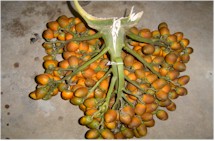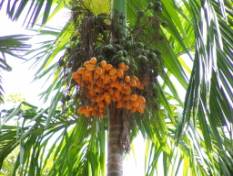
Introduction
The arecanut palm (Areca catechu L.) is one of the important commercial crops of India. The crop is mainly grown in the states of Kerala, Karnataka, Tamil Nadu, Assam, West Bengal, Meghalaya, Maharashtra, and Andaman & Nicobar group of Islands. The economic produce is the fruit called betelnut or 'supari' which is used mainly for mastigatory purpose. Arecanut is an essential ingredient of ‘gutka’ and ‘pan masala.’ It is consumed both as a raw/ripe nut (adaka or kacha tamul), as dried ripe nut (chali supari) and as semi-mature, cut and processed varieties `Bateldike’ or `Kalipak’.
Arecanut or betlelnut is an extensively cultivated tropical palm. It is a tall-stemmed, erect, reaching varied height, depending upon the environmental conditions.

Climate & Soil
Arecanut grows well within the temperature range of 14ºC and 36ºC and is adversely affected by temperatures below 10ºC and above 40ºC. Extremes of temperature and wide diurnal variations are not conducive for the healthy growth of the palms. It can be grown in areas receiving annual rainfall of 750 mm to 4,500 mm. In areas where there is prolonged dry spell, the palms are irrigated. Due to its susceptibility to low temperature, a good crop of arecanut cannot be obtained at an altitude of more than 1000 m MSL.
The largest area under the crop is found in gravelly laterite soils of red clay type. It can also be grown on fertile clay loam soils. Sticky clay, sandy, alluvial, brackish and calcareous soils are not suitable for arecanut cultivation.
